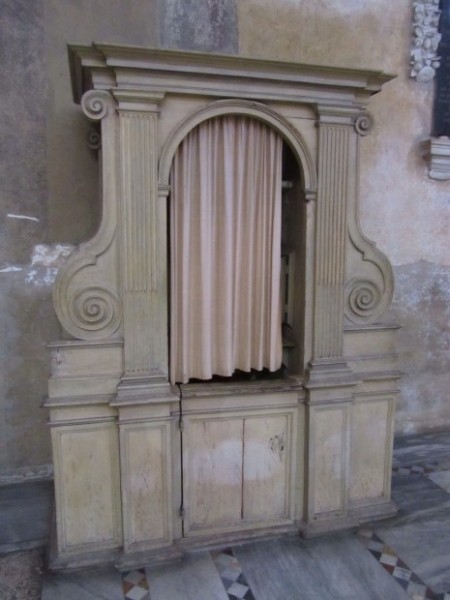
The confessional above is, as indicated, from Santa Sabina; for some reason, my husband–who I do believe tried to photograph every inch of Rome–did not manage to get a picture of the confessionals at St. John Lateran, the “Cathedral of Rome.”
Possibly his own sense of discretion prevented a snapshot, because while we were there the confessionals were constantly in use, just on the other side of the magnificent nave full of huge representations of the apostles:

I was one who made a point of partaking of the sacrament of confession at San Giovanni Laterano; I couldn’t help but think that confession there, in that incredibly holy and historic place, in a confessional that provided no shield (the booths are quiet open; everyone can see you confessing) would be grace-filled, and accepted as an act of complete trust in God’s protection, guidance and mercy.
And I think I may have had precisely the same sighing Irish priest that David Mills writes about so brilliantly, in this piece from Inside Catholic.
While in Rome recently, I went to confession at St. John Lateran. It’s the cathedral of Rome, and I’d heard the grace was better there. I got an old Irish priest, soft-spoken, deliberate, patient, and with a habit of sighing frequently as you spoke. […] I soon realized that I could confess to stealing a dime or murdering an abbess, and he would have sighed in the same way. The sighing may have been a technique, but it worked on me. The absolution came more powerfully because he had sighed, and put me in my place far better than some earnest priests I’ve had, whose very earnestness made me feel important and my sins dramatic.
[…]
A friend of mine recently spoke to the theology class at an Evangelical Protestant college. Both Catholic and Protestant friends had told him that the students would grill him about theological issues, particularly justification by faith, and he spent hours preparing himself to answer their questions. They didn’t mention the subject at all: What they wanted to know about was confession, and more the practice and experience than the theology. They really wanted to know what you did and why you did it, and how it felt to tell some man what could be your deepest secrets. They approached my friend as sick people approach someone who’s been cured of the same disease by an established but still alternative and fringe treatment.One can guess the reason. Many people who believe they can simply pray to God and be forgiven, whatever they’ve done, long for the chance to tell someone out loud, someone who will then declare God’s forgiveness and give them some penance, some way of expressing their sorrow and growing closer to God at the same time.
They want what Catholics have. In Rome, I knelt, listening to the priest sighing, in that place where prayer has been valid, with Our Lord in the Sacrament about 30 feet away, and the relics of St. Peter and St. Paul about 70 feet in the other direction. I felt the usual mixture of shame and relief and the sense — this I’ve only come to see after several years as a Catholic — that, as my Evangelical friends like to say, I’m really here to do serious business with God.
You’ll want to read the whole thing.
One of the best confessors I’ve ever had was a Chinese priest who had fought for his vocation while in China, and who had a gentle way of looking at things, born of having seen and lived through a great deal that most people never will. I confessed a sin that was weighing heavily on me–a true sin, no over-scrupulous conceit–and he sighed, just like that Irish priest; “well, that was a stupid thing to do,” he said, and it was like having someone take the burden from my shoulders.
For all of the well-meaning priests who try to gently let someone off the hook in the confessional, or who–in attempting to demonstrate the mercy of God–are perhaps too quick to say “it’s okay, you’re only human” (true as that is) I have always been so grateful for the simple acknowledgment by a simple priest that I had done something that was, yes, stupid and destructive, but that mercy was mine.
Sometimes it is not enough to hear “Jesus loves you and forgives your sins,” you need to hear, “yeah, girl, you screwed that up, pretty good,” too. If the weight and depth of the sin is never plumbed, how can the uplifting counterbalance of Grace be properly, gratefully, understood?
Writes Mills:
. . . we need to recover the use of the word “confession,” while quietly dropping “the sacrament of reconciliation.” We need to hear the blunt word, because, before everything else, we want to say, “I did this and I’m really sorry.” That’s the appeal of confession, the chance to get it all out in the open. To emphasize the result is a bit like renaming the emergency room the “healing center.” It’s true, but not as helpful or as encouraging as you’d think, particularly when you really have an emergency.

St. Bartholomew, who was skinned alive in his martyrdom. Confession is easier.
All Images, Elizabeth Scalia











